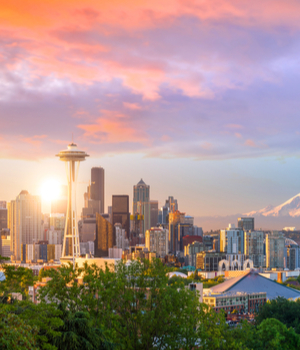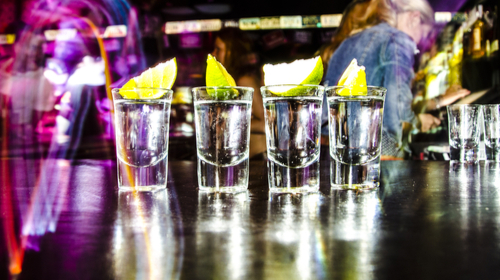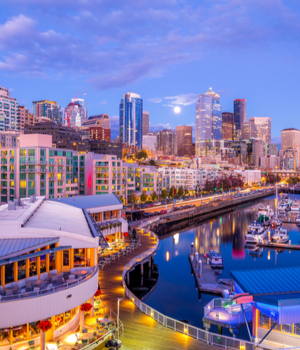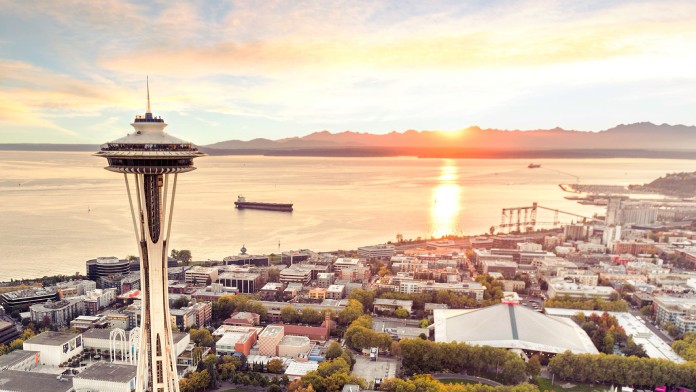Expert Insights
The downtown area of Seattle around Third Avenue and Pike is known as “The Blade,” where you’ll find drugs, homelessness, and have to fend for yourself. But, after speaking to a social worker friend of mine, I’m happy to hear that not everything that goes down there is an open-air drug market. There’s a new initiative called the Third Avenue Project: a coalition of social workers, services providers and advocates who are on the streets helping combat drugs, crime, and poverty in a novel way! They’re doing so much more than providing basic human basic supplies, like food — they’ve also saved 11 lives using opioid overdose reversal drug, Narcan. The teams are also getting to know residents, understand their challenges, and see how they can relate to services. I think this is a great initiative because it supports treating people experiencing homelessness like humans deserving of basic care and they’re then much more likely to get into recovery because they have something to live for.
~ Olivia Pennelle
How Expensive is Drug Rehab in Seattle?
The cost of treatment in Seattle can vary widely, depending on the program you choose and your financial circumstances. Inpatient care is the most expensive because fees cover room, board, and a full staff of therapists and other healthcare professionals.
Because they are less resource-intensive than inpatient programs, outpatient typically is less expensive. You also may be able to pay per session or work out a payment plan.
Are There Low-Cost and Free Drug Rehab Centers in Seattle?
For those who cannot afford it on their own, free and low-cost programs also are available. These programs may be funded by federal or state grants or by nonprofit organizations using private funding.
Free services can range from intensive inpatient that includes detox and withdrawal support to ongoing medical management on an outpatient basis. State-funded programs typically have the most comprehensive support for both inpatient and outpatient. However, they likely will not have all the amenities offered by mid-range or luxury facilities.
You must show that you are unable to pay for care, along with other information, such as legal residency in Washington and your history of addiction. If you are seeking inpatient care, you may be placed on a waiting list until a spot opens.
Does Insurance Cover Rehab Center Costs?
 Costs can be high, especially for a stay in a residential center, which typically runs for a month or more. But many health insurance plans can cover all or most of the cost, minus your regular copays for services under the terms of your plan.3
Costs can be high, especially for a stay in a residential center, which typically runs for a month or more. But many health insurance plans can cover all or most of the cost, minus your regular copays for services under the terms of your plan.3
Group and individual health insurance plans offered in the Affordable Care Act (ACA) marketplace now cover substance abuse treatment as an essential benefit. The Mental Health Parity and Addiction Equity Act (MHPAEA) of 2008 is a recently enacted federal law that requires health plans and insurance to provide equivalent benefits for both substance abuse services and standard medical or surgical procedures.4
Tricare, the government insurance provider for the U. S. military as well as its dependents and retirees, also covers a range of services. These include:5
- Inpatient hospital services
- Residential programs
- Psychotherapy
- Outpatient services
Private Insurance
Full coverage for all services is not guaranteed with private health insurance. Many of these programs do offer employee assistance that includes some help with addiction services. Most major private insurance carriers cover many—if not all—the costs of a drug and alcohol program. However, the scope of covered services can vary considerably.
Insurance coverage depends on whether needed services are available from providers in network with the insurer. Out-of-network services might not be covered under your chosen plan, or they may be covered in a limited way. Individual clinics make their own decisions about which, if any, insurance plans and providers they accept. Thus, you should check with the program to verify if they accept your insurance.
Medicaid
Medicaid is a government-sponsored health insurance program for low-income residents of all states, the District of Columbia, and U.S. territories. It is available to people of all ages who meet certain requirements, including income and disability. In 2020, the ACA mandated that Medicaid must cover essential services for substance use disorders.6
In Washington, Medicaid is called Apple Health, and it covers a wide range of services, including:13
- Assessments
- Alcohol treatment
- Involuntary treatment under Ricky’s Law
- Detox and withdrawal support
- Outpatient and inpatient hospital stays
- Medications to treat opioid use disorder (OUD)
However, be aware that private facilities and detox centers in Seattle may not accept Medicaid as a payment option.
Medicare
Medicare is a federally funded health insurance program for those age 65 and older or those living with a disability. Premiums are based on monthly income—the less you earn, the lower your Medicare premium is, generally.
As an alternative, Medicare Part C is private insurance approved by Medicare. These plans may offer additional services alongside those offered by Medicare itself, such as additional outpatient options such as programs for women, trauma survivors, or families. As with Medicaid, some private facilities may not accept Medicare.
Does Your Insurance Plan Cover Addiction Treatment?
Yes, partially. Most insurance plans are likely to cover at least some aspects of your care. However, individual facilities establish their own policies about the plans they accept, so should verify your coverage before applying.
How to Finance Drug and Alcohol Rehab in Seattle
Whether you are looking for inpatient or outpatient addiction care, it can be costly. This is especially so if you do not have insurance or the option of entering a free program in your area. However, many addiction treatment centers and community services can help manage those costs so that help is available to just about anyone who needs it.
Apply for a Scholarship
A scholarship is a relatively new way to cover addiction treatment. Some programs offer scholarships out of funds set aside to cover the full cost of the program for a select few applications or to help bridge the gap between health insurance and your available funds.
Find a Sliding-Scale Program
Some programs work directly with prospective patients to help them cover program costs. Along with payment plans, addiction treatment services may adjust fees based on your income. This is called a sliding scale. Sliding-scale fees may be combined with other payment options. Check with the program you are interested in to discover if they offer a sliding scale.
Choose a Program that Offers Payment Plans
Inpatient and outpatient programs may also offer payment plans. These plans, with varying terms and rates, allow patients to pay for help over time, with monthly payments adjusted to individual circumstances. Contact the clinic directly and ask about payment plan options or other fee adjustments.
How Does Seattle Compare in Alcohol and Drug Use?
Seattle, Washington, is surrounded by water, mountains, evergreen forests, and thousands of acres of parkland. However, the state of Washington faces a growing opioid epidemic. Despite this, Washington is among the states with the fewest people getting active treatment for substance abuse issues.1 If you or someone you know is part of this group, professional addiction treatment could help save your life. There are nearly 150 alcohol and drug rehab centers in Seattle and the surrounding area, with a variety of programs to suit every need.2
Here are some substance abuse stats related to Seattle and Washington:1,2

Washington ranks 15th in the nation for drug use.

The state is among the top five with the highest number of drug users.

Binge drinking is prevalent among more than 18% of adults in Washington.

Excessive alcohol consumption costs the state nearly $6 billion per year.
Seattle Laws on Alcohol and Drugs
Laws in Washington include the following regulations concerning substance use and misuse:16,17
Drug Courts: Washington residents who are charged with a first-offense, non-violent substance-related crime that does not involve DUI may be eligible to attend court-ordered rehabilitation instead of serving jail time.
Good Samaritan Law: Washington’s Good Samaritan Law encourages people to call for medical assistance during an overdose. The law protects those who call 911 from prosecution for minor drug-related charges.
Naloxone Access: Washington state laws allow anyone at risk of drug overdose or who may be in a position to help someone experiencing an overdose to obtain and administer naloxone. Additionally, doctors may prescribe naloxone directly to an organization, such as a homeless shelter, and some pharmacies can dispense naloxone to individuals without a prescription.
Drug Paraphernalia: In the state of Washington, possession of the following drug paraphernalia is considered a misdemeanor punishable by up to 90 days in jail and a $1,000 fine.
- Cocaine spoons or vials
- Scales and balances
- Hypodermic needles or syringes
- Equipment used to test strength and purity
- Kits to process or manufacture illicit substances
- Chemicals used for cutting or diluting illicit substances
- Mixing devices
- Packaging equipment
- Pipes
Marijuana Laws: Marijuana is legal for both medical and recreational use in Washington. People 21 years and older can possess up to one ounce of cannabis, 16 ounces of marijuana-infused solid product, or 72 ounces in liquid form. All marijuana must be purchased from a state-licensed facility and consumed on private property. If you drive under the influence of marijuana, you could still serve jail time, have your license suspended, face a $3,500 fine, insurance premium increase, and ignition interlock requirements.
Choosing the Right Level of Care
From a hospital room to the comfort of your own home, addiction programs can take place in a variety of settings. There is a model that works for nearly any unique circumstance. Successful care can also involve multiple settings, such as continuing an outpatient program after a stay in a residential facility.
Medical Detox
The detox process safely removes all traces of drugs and alcohol from your body. This initial step takes place in a hospital or inpatient setting, where medical personnel can supervise and make you comfortable during withdrawal.
Inpatient
Residential treatment usually involves group and individual therapy, family therapy, medication, and other recreational therapy techniques. Members get these treatments while living at a facility under 24/7 supervision.
Partial Hospitalization Programs (PHPs)
PHPs are less intensive than inpatient, because you only stay at the facility during times you are receiving care. Methods of treatment usually involve some of the same methods used in residential care.
Intensive Outpatient Programs (IOPs)
IOPs offer several hours of treatment spread throughout the week. Usually, this will include individual and group therapy. Seattle residents may transition to IOPs after completing a residential or PHP program.
Standard Outpatient
Standard outpatient programs involve two or three hours of care per week. This service usually takes place at an outpatient clinic or at a therapist’s office. This level of care is best for individuals who are highly motivated and have strong support systems.
Aftercare
The goal of aftercare is to prevent you from relapsing. It includes supportive, ongoing treatment such as 12-step groups, transitional housing, or other accountability groups.
Finding Specialized Drug Rehabs in Seattle
Although many programs are open to anyone seeking treatment, it can also be helpful to get support from a program that is designed to meet the unique needs of a specific population. Seattle has a variety of facilities that provide a supportive and understanding environment for selected groups to work on recovery.
LGBTQ+
The LGBTQ+ community faces higher rates of substance use disorders than the general population.7 Facilities friendly to LGBTQ+ offer standard services with a sensitivity to issues such as discrimination and victimization experienced by people who identify as LGBTQ+.
Men-Only
Men-only programs focus exclusively on the issues that affect addiction issues and recovery for men. They allow men to openly deal with the issues that contribute to their substance use disorders and interfere with recovery without the distractions of a general setting where women are present.
Women-Only
A women-only program also offers women a safe space to address addiction issues and work toward recovery. Many women dealing with substance use issues have also experienced domestic violence, rape, or other trauma, and a women-only program provides a non-threatening environment for working through these intertwined issues and finding a path toward recovery.
Teen
Addiction rates among teens are on the rise, but programs designed for adults may not adequately address the issues they are facing. Teen-centered programs can focus specifically on the factors that contribute to addiction in teens, such as peer pressure, bullying, and social isolation.
Veteran
Veterans, particularly those who have served in combat, have higher rates of substance use disorders than the general population. Programs for veterans are designed to address their unique issues and other issues that disproportionately affect them, such as post-traumatic stress disorder or PTSD.
Should You Travel for Drug and Alcohol Rehab in Seattle?
 Seattle is a large city with plenty of amenities and a wide range of options.
Seattle is a large city with plenty of amenities and a wide range of options.
If you are living in an area with limited resources for addiction treatment, or if you are looking for centers that serve a specific population or need, then you may want to consider traveling to Seattle.
However, if you are not entering an inpatient program that includes room and board, you will also need to account for relatively high living expenses in Seattle along with the costs of your program.
Consider the following questions to determine if you should travel for rehab:
- Do you have access to the type(s) of care you need in your local area? If not, are those type(s) of care readily available in Seattle?
- Do you need to separate yourself from your day-to-day environment so you can eliminate distractions and focus on recovery?
- Does your health insurance cover treatment at Seattle alcohol rehabs? If it does, does your plan cover any of your travel-related expenses?
- Do you know anyone in the area who can support you while you work through recovery?
Resources
- Substance Abuse and Mental Health Services Administration. (2014). The NSDUG Report Metro Brief: Substance Use and Mental Health Disorders in the Seattle-Tacoma Metropolitan Statistical Area.
- FindTreatment.gov. (n.d.). FindTreatment.gov.
- Substance Abuse and Mental Health Services Administration. (2021). 2019-2020 National Survey on Drug Use and Health National Maps of Prevalence by State. Center for Behavioral Health Statistics and Quality. National Survey on Drug Use and Health.
- U. S. Department of Health and Human Services. (2021). Mental Health and Substance Use Insurance Help.
- U. S. Centers for Medicare and Medicaid Services. (n.d.). The Mental Health Parity and Addiction Equity Act (MHPAEA).
- Defense Health Agency (DHA). (2022). TRICARE Can Help If You Have a Substance Use Disorder. Military Health System. U. S. Department of Defense.
- U. S. Centers for Medicare and Medicaid Services. (n.d.). Your Medicare Costs | Get Help Paying Costs | Medicaid.
- Green, K. E., & Feinstein, B. A. (2012). Substance Use in Lesbian, Gay, and Bisexual Populations: An Update on Empirical Research and Implications for Treatment. Psychology of Addictive Behaviors: Journal of the Society of Psychologists in Addictive Behaviors, 26(2), 265-278.
- Legislative Information Center. Office of the City Clerk. (2021). Resolution 32021 Version 2. City of Seattle.
- State of Washington 67th 2022 Regular Session. (2022). Senate Bill 5660: Concerning access to psilocybin services by individuals 21 years of age and older.
- Washington State Liquor and Cannabis Board. (2021). Know the Law.
- Mericle, A. A., Mahoney, E., Korcha, R., Delucchi, K., & Polcin, D. L. (2019). Sober Living House Characteristics: A Multilevel Analysis of Factors Associated with Improved Outcomes. Journal of Substance Abuse Treatment, 98, 28–38.
- Proctor, S. L., & Herschman, P. L. (2014). The Continuing Care Model of Substance Abuse Treatment: What Works, and When Is “Enough,” “Enough?”. Psychiatry Journal, 2014, 692423.
- Washington State Health Care Authority. (2022). Substance use treatment.
- Washington State Health Care Authority. (2022). Eligibility.
- Washington State Legislature. (2000). Drug offender sentencing alternative—Prison-based or residential alternative.
- Washington State Legislature. (2010). Medical assistance—Drug-related overdose—Prosecution for possession.



